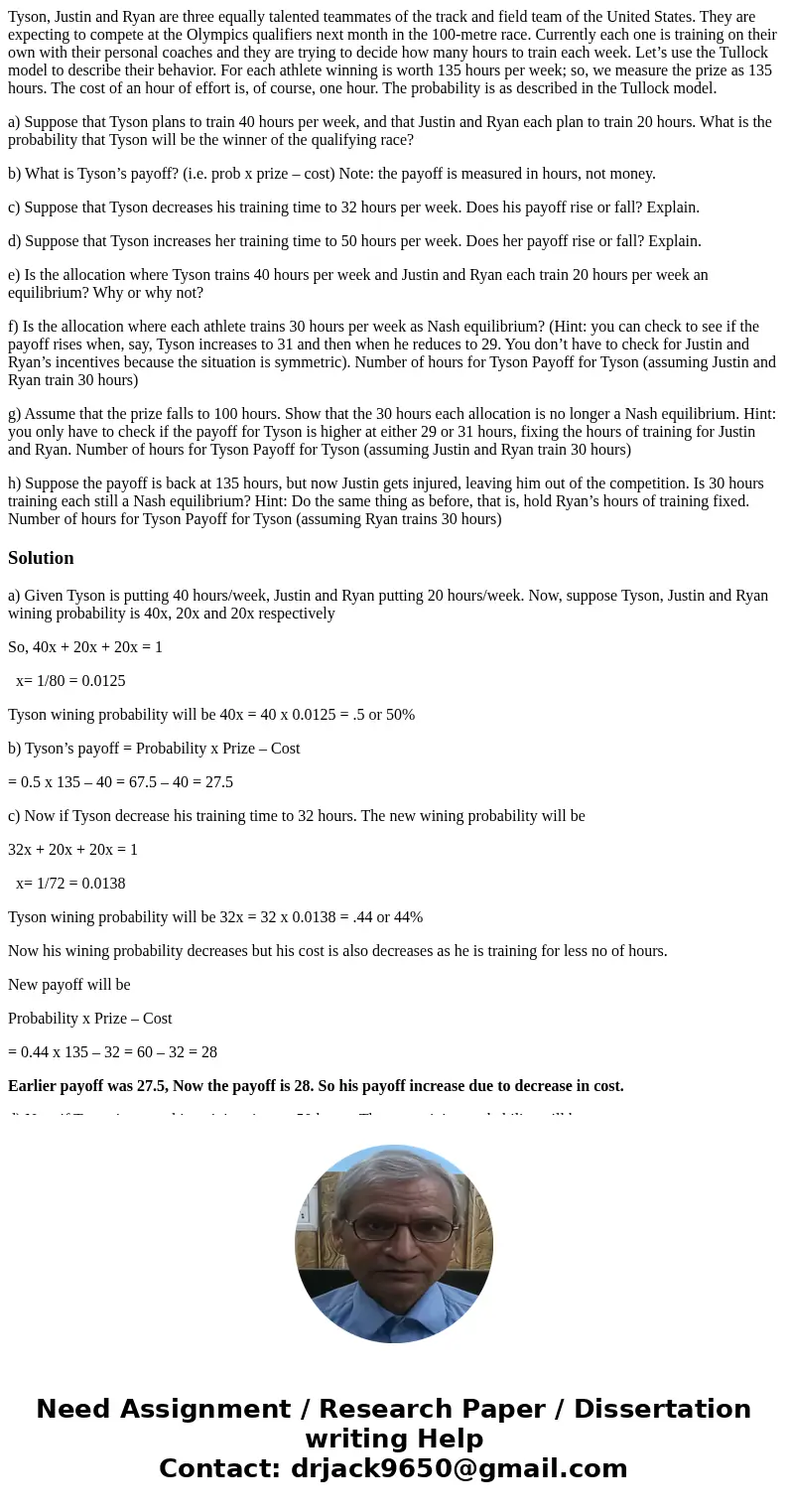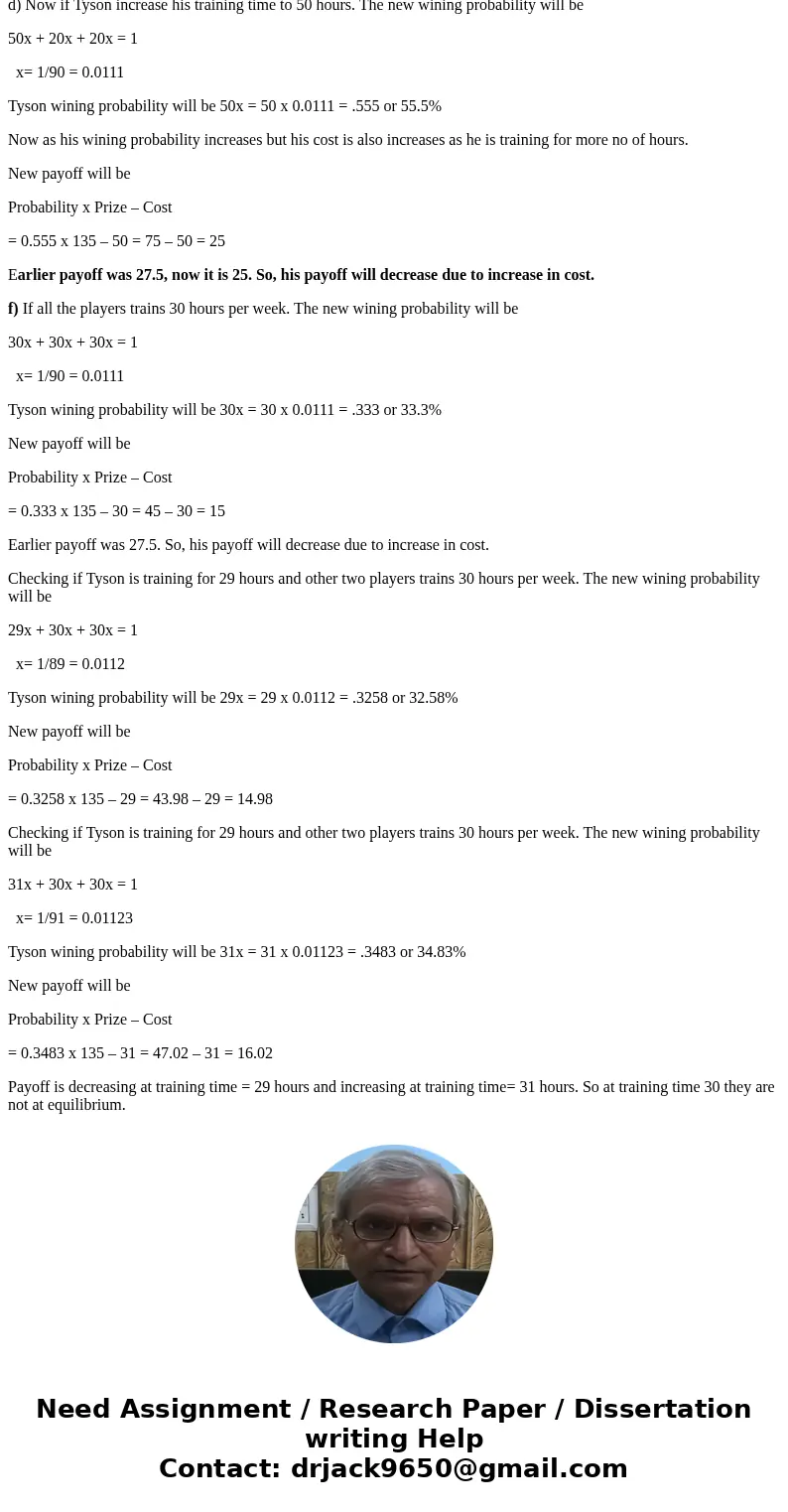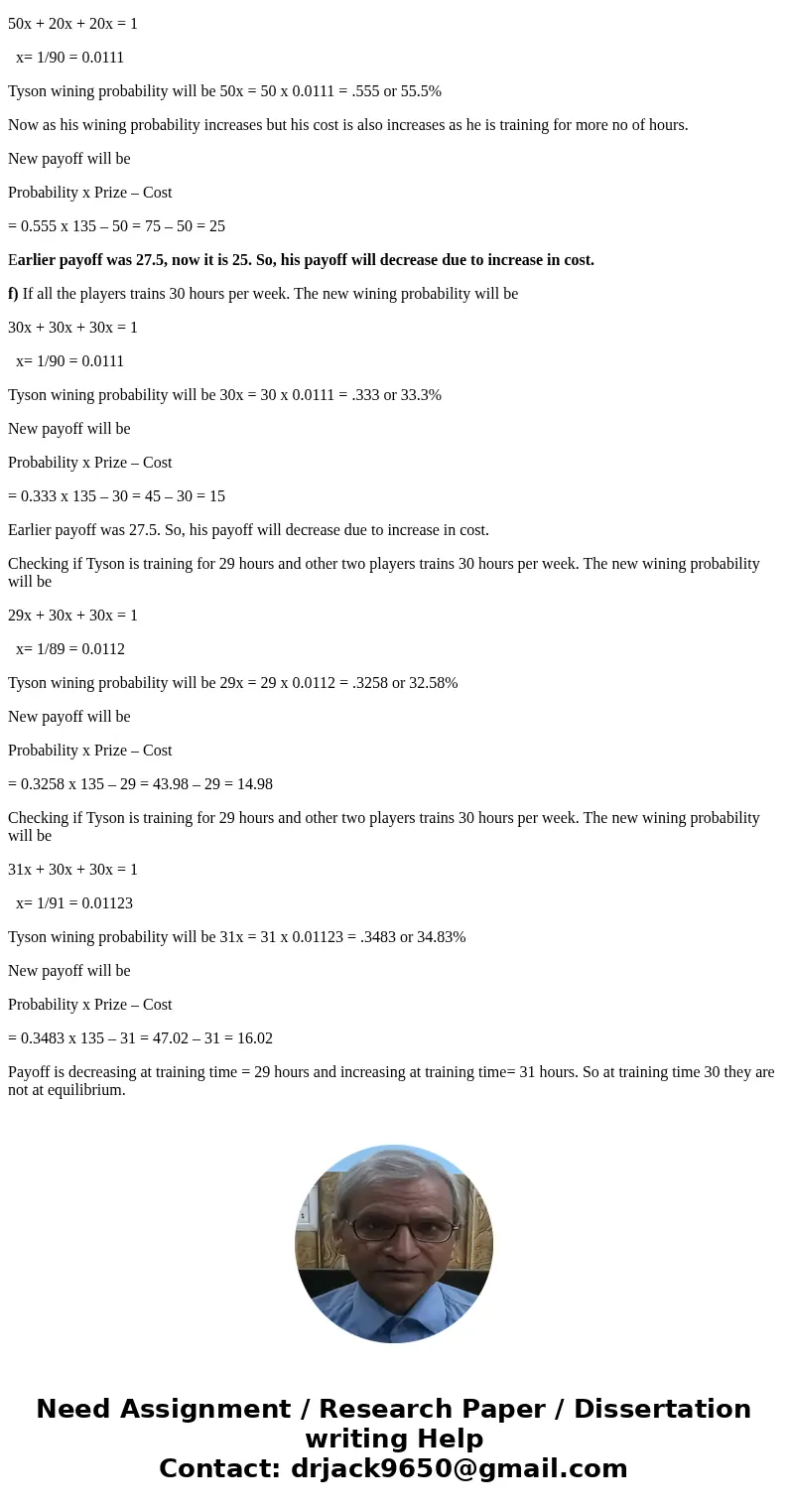Tyson Justin and Ryan are three equally talented teammates o
Tyson, Justin and Ryan are three equally talented teammates of the track and field team of the United States. They are expecting to compete at the Olympics qualifiers next month in the 100-metre race. Currently each one is training on their own with their personal coaches and they are trying to decide how many hours to train each week. Let’s use the Tullock model to describe their behavior. For each athlete winning is worth 135 hours per week; so, we measure the prize as 135 hours. The cost of an hour of effort is, of course, one hour. The probability is as described in the Tullock model.
a) Suppose that Tyson plans to train 40 hours per week, and that Justin and Ryan each plan to train 20 hours. What is the probability that Tyson will be the winner of the qualifying race?
b) What is Tyson’s payoff? (i.e. prob x prize – cost) Note: the payoff is measured in hours, not money.
c) Suppose that Tyson decreases his training time to 32 hours per week. Does his payoff rise or fall? Explain.
d) Suppose that Tyson increases her training time to 50 hours per week. Does her payoff rise or fall? Explain.
e) Is the allocation where Tyson trains 40 hours per week and Justin and Ryan each train 20 hours per week an equilibrium? Why or why not?
f) Is the allocation where each athlete trains 30 hours per week as Nash equilibrium? (Hint: you can check to see if the payoff rises when, say, Tyson increases to 31 and then when he reduces to 29. You don’t have to check for Justin and Ryan’s incentives because the situation is symmetric). Number of hours for Tyson Payoff for Tyson (assuming Justin and Ryan train 30 hours)
g) Assume that the prize falls to 100 hours. Show that the 30 hours each allocation is no longer a Nash equilibrium. Hint: you only have to check if the payoff for Tyson is higher at either 29 or 31 hours, fixing the hours of training for Justin and Ryan. Number of hours for Tyson Payoff for Tyson (assuming Justin and Ryan train 30 hours)
h) Suppose the payoff is back at 135 hours, but now Justin gets injured, leaving him out of the competition. Is 30 hours training each still a Nash equilibrium? Hint: Do the same thing as before, that is, hold Ryan’s hours of training fixed. Number of hours for Tyson Payoff for Tyson (assuming Ryan trains 30 hours)
Solution
a) Given Tyson is putting 40 hours/week, Justin and Ryan putting 20 hours/week. Now, suppose Tyson, Justin and Ryan wining probability is 40x, 20x and 20x respectively
So, 40x + 20x + 20x = 1
x= 1/80 = 0.0125
Tyson wining probability will be 40x = 40 x 0.0125 = .5 or 50%
b) Tyson’s payoff = Probability x Prize – Cost
= 0.5 x 135 – 40 = 67.5 – 40 = 27.5
c) Now if Tyson decrease his training time to 32 hours. The new wining probability will be
32x + 20x + 20x = 1
x= 1/72 = 0.0138
Tyson wining probability will be 32x = 32 x 0.0138 = .44 or 44%
Now his wining probability decreases but his cost is also decreases as he is training for less no of hours.
New payoff will be
Probability x Prize – Cost
= 0.44 x 135 – 32 = 60 – 32 = 28
Earlier payoff was 27.5, Now the payoff is 28. So his payoff increase due to decrease in cost.
d) Now if Tyson increase his training time to 50 hours. The new wining probability will be
50x + 20x + 20x = 1
x= 1/90 = 0.0111
Tyson wining probability will be 50x = 50 x 0.0111 = .555 or 55.5%
Now as his wining probability increases but his cost is also increases as he is training for more no of hours.
New payoff will be
Probability x Prize – Cost
= 0.555 x 135 – 50 = 75 – 50 = 25
Earlier payoff was 27.5, now it is 25. So, his payoff will decrease due to increase in cost.
f) If all the players trains 30 hours per week. The new wining probability will be
30x + 30x + 30x = 1
x= 1/90 = 0.0111
Tyson wining probability will be 30x = 30 x 0.0111 = .333 or 33.3%
New payoff will be
Probability x Prize – Cost
= 0.333 x 135 – 30 = 45 – 30 = 15
Earlier payoff was 27.5. So, his payoff will decrease due to increase in cost.
Checking if Tyson is training for 29 hours and other two players trains 30 hours per week. The new wining probability will be
29x + 30x + 30x = 1
x= 1/89 = 0.0112
Tyson wining probability will be 29x = 29 x 0.0112 = .3258 or 32.58%
New payoff will be
Probability x Prize – Cost
= 0.3258 x 135 – 29 = 43.98 – 29 = 14.98
Checking if Tyson is training for 29 hours and other two players trains 30 hours per week. The new wining probability will be
31x + 30x + 30x = 1
x= 1/91 = 0.01123
Tyson wining probability will be 31x = 31 x 0.01123 = .3483 or 34.83%
New payoff will be
Probability x Prize – Cost
= 0.3483 x 135 – 31 = 47.02 – 31 = 16.02
Payoff is decreasing at training time = 29 hours and increasing at training time= 31 hours. So at training time 30 they are not at equilibrium.



 Homework Sourse
Homework Sourse